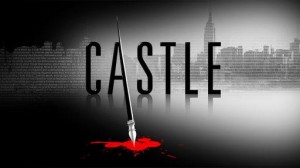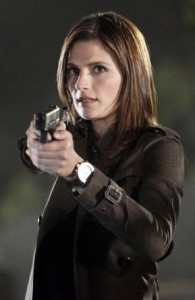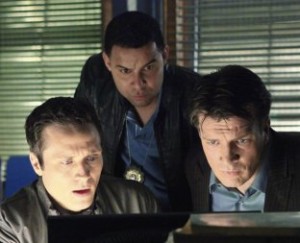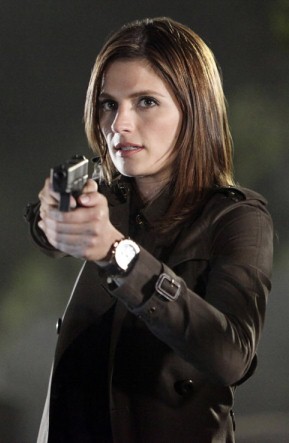Seeking SFH: Kate Beckett
When seeking strong female heroines, a comedy-drama police-procedural television series like ABC’s Castle probably wouldn’t be at the top of most people’s list of places to start. Yet the show’s female lead – homicide detective Kate Beckett, played by Stana Katic – is a great example of a well-designed, successful character who also fits the bill as strong, female, and heroic.
 From a storytelling perspective, Beckett is a particularly fun strong female heroine because her meta itself is something of an inside joke for writers. For one, Beckett is literally a muse. The show’s premise is that its male lead – novelist Richard Castle, played by the inimitable Nathan Fillion – has used his bestselling-author fame and his connections to New York City’s mayor to arrange what amounts to an indefinite ridealong with Beckett and her colleagues in the NYPD’s 12th Precinct as research for his new series of crime novels. Beckett becomes the inspiration for the novels’ protagonist, Nikki Heat, and ABC has gone all-in on the premise, publishing three Nikki Heat novels by “Richard Castle” – which, to bring the surreal full circle, became actual New York Times bestsellers. In addition, the show’s writers have included repeated references to Beckett’s familiarity with superheroes and comic books, not just in her youth but as an adult, as well. This isn’t exactly high on the list of expected traits for a tough-as-nails female cop, yet it works well for the character. Castle is full of pop-culture references of all sorts, and showing that Beckett can go toe to toe with Castle even when it comes to geek knowledge not only gives her personality more depth but also smashes some stereotypes along the way. It also gives a hint about where Beckett herself may draw some of her inspiration for her own strength, courage, and commitment to truth, justice, and the American way.
From a storytelling perspective, Beckett is a particularly fun strong female heroine because her meta itself is something of an inside joke for writers. For one, Beckett is literally a muse. The show’s premise is that its male lead – novelist Richard Castle, played by the inimitable Nathan Fillion – has used his bestselling-author fame and his connections to New York City’s mayor to arrange what amounts to an indefinite ridealong with Beckett and her colleagues in the NYPD’s 12th Precinct as research for his new series of crime novels. Beckett becomes the inspiration for the novels’ protagonist, Nikki Heat, and ABC has gone all-in on the premise, publishing three Nikki Heat novels by “Richard Castle” – which, to bring the surreal full circle, became actual New York Times bestsellers. In addition, the show’s writers have included repeated references to Beckett’s familiarity with superheroes and comic books, not just in her youth but as an adult, as well. This isn’t exactly high on the list of expected traits for a tough-as-nails female cop, yet it works well for the character. Castle is full of pop-culture references of all sorts, and showing that Beckett can go toe to toe with Castle even when it comes to geek knowledge not only gives her personality more depth but also smashes some stereotypes along the way. It also gives a hint about where Beckett herself may draw some of her inspiration for her own strength, courage, and commitment to truth, justice, and the American way.
Kate Beckett is certainly a strong character, both in the traditional mold of a successful police detective and in a more subtle, less brute-force style characteristic of women’s strength. Killers end up on the wrong end of a Beckett investigation to their misfortune; she is smart, insightful, creative, and relentless. Although she engages in fistfights and fires her gun less than many male cops on television, she has chased down her share of unsuccessfully fleeing suspects and has proven herself more than capable of a physical takedown when necessary. And you do not want to be on the other side of an interrogation table from her, whether its intimidation, sympathy, or the devastating facts she’s deploying against you. But Beckett’s strength is not just physical; she is unafraid to take on cases even when they are emotionally difficult for her, and she never hesitates to stand up to her Captain, or to Castle, when she knows she’s right. She values her integrity, so she usually goes by the book, but she’s unafraid to disobey orders when she has to. When she can’t prevail with insistence or persuasion, she plays the long game – looking for new angles, showing patience, waiting for a mistake or an opening to break the case. Finally, she has little patience for double standards or demeaning stereotypes of women. More than once she’s flashed a satisfied smile at showing up someone who underestimated her, and, more recently, a wicked grin at Castle after tormenting him with a refusal to tell him her “number” during an exchanged about sexual partners.
 At the same time, Castle’s writers have shown Beckett to have vulnerabilities as well, like any well-crafted character does. Most prominent through the first four seasons has been her unhealthy obsession with her mother’s murder. While her passion for solving the case is understandable, it can consume her life and cloud her judgment. In candid moments, it becomes clear that she has been unable to make peace with her loss or heal from her grief. The pursuit of closure and justice is one thing; an inability to move on with life is something else. Certainly her continued need for answers has kept her from admitting her feelings for Castle, as though letting herself love him would diminish her commitment to her mother’s cause. Additionally, at the start of the fourth season Beckett faced the challenge of accepting and overcoming post-traumatic stress in the aftermath of a near-fatal sniper’s bullet to the chest. The writers and Katic combined to produce a vivid, realistic, and empathetic portrayal of the symptoms PTSD presents – including a strong person’s insistence that they’re fine when deep down they’re not, and the sudden bursts of anger or fear that can come at a moment’s notice from unexpected triggers. Yet Beckett’s emotional struggle never made her weak, only human, and that is no easy balance to strike for writers or actors.
At the same time, Castle’s writers have shown Beckett to have vulnerabilities as well, like any well-crafted character does. Most prominent through the first four seasons has been her unhealthy obsession with her mother’s murder. While her passion for solving the case is understandable, it can consume her life and cloud her judgment. In candid moments, it becomes clear that she has been unable to make peace with her loss or heal from her grief. The pursuit of closure and justice is one thing; an inability to move on with life is something else. Certainly her continued need for answers has kept her from admitting her feelings for Castle, as though letting herself love him would diminish her commitment to her mother’s cause. Additionally, at the start of the fourth season Beckett faced the challenge of accepting and overcoming post-traumatic stress in the aftermath of a near-fatal sniper’s bullet to the chest. The writers and Katic combined to produce a vivid, realistic, and empathetic portrayal of the symptoms PTSD presents – including a strong person’s insistence that they’re fine when deep down they’re not, and the sudden bursts of anger or fear that can come at a moment’s notice from unexpected triggers. Yet Beckett’s emotional struggle never made her weak, only human, and that is no easy balance to strike for writers or actors.
A common difficulty with the characterization of strong female heroines is that it can too often focus on the strength and heroism and lose sight of the girl or woman at the center of the character. Particularly with women in more traditionally macho roles like police officer or soldier, it is easy to end up with a hero-with-boobs instead of a heroine. Another great success of Castle’s writers and Katic’s acting is that Beckett consistently has been strongly female as well as strongly heroic.
Castle draws large numbers of women television viewers, and Beckett’s qualities as a relatable female character are a significant contributing factor. Although much of the time she wears the utilitarian clothes of a homicide detective, she is more than capable of dressing up and showing off her beauty when the moment calls for it; much of the time she is commanding and stern to draw the fear or respect her job requires, but she turns on the charm or flirting when a softer touch might crack what intimidation could not. She struggles to balance her career and her personal life, and like many driven and successful women she often has put the former ahead of the latter. But unlike some female leads, a frequent undercurrent throughout the series has reminded the audience that Beckett is looking for love, such as quick references to dates with robbery detective Tom or motorcycle-riding surgeon Josh and the gradual progression of her growing feelings for Castle himself.
 Even more than the undercurrent of romance, though, is the consistent emphasis on Beckett’s relationships with her friends. Her tagteam co-workers Ryan and Esposito always have her back, and she can trust them with information she would not tell anyone else. Laney is a close female friend, and Beckett also quickly strikes up an amiable relationship with Castle’s mother Martha and daughter Alexis. Even with the occasional flirting and innuendo, Castle himself has been far more a trusty and dedicated ally than a not-quite-boyfriend. When Beckett faces down her PTSD, it is her friends and their support, not a lover or romance, that gives her the strength to conquer her demons. Few heroes win the day alone, and Beckett has a reliable team of colleagues and friends who help her solve murders and make the city safer.
Even more than the undercurrent of romance, though, is the consistent emphasis on Beckett’s relationships with her friends. Her tagteam co-workers Ryan and Esposito always have her back, and she can trust them with information she would not tell anyone else. Laney is a close female friend, and Beckett also quickly strikes up an amiable relationship with Castle’s mother Martha and daughter Alexis. Even with the occasional flirting and innuendo, Castle himself has been far more a trusty and dedicated ally than a not-quite-boyfriend. When Beckett faces down her PTSD, it is her friends and their support, not a lover or romance, that gives her the strength to conquer her demons. Few heroes win the day alone, and Beckett has a reliable team of colleagues and friends who help her solve murders and make the city safer.
So when fiction writers and storytellers say they don’t know where to look for models of how to write a strong female character and do it right, our advice is this – sit down and watch some Castle. Their writers definitely get it.
B.J. Priester is editor of FANgirl Blog and contributes reviews and posts on a range of topics. A longtime Star Wars fandom collaborator with Tricia, he is also editing her upcoming novel Wynde. He is a law professor in Florida and a proud geek dad.
- BJ Priester Talks The Acolyte Episode 6 on Who’s the Bossk? - July 7, 2024
- Dave Filoni Talks Writing AHSOKA and Guiding the Future of Star Wars Storytelling - June 21, 2024
- Lessons in Franchise Management – MCU: The Reign of Marvel Studios - January 14, 2024










Beckett’s definitely one of my favorites. She’s a great multi-dimensional character and definitely someone you’d want in your corner.
I agree with everything in this article. I’m so glad these character analyses are being written. Kate Beckett is my favourite female TV character at the moment. Sixteen years ago it was Scully, now it’s Kate Beckett.
While Scully’s character development was problematic for me for a number of reasons, I can find justification even for Kate Beckett’s seemingly sexual objectification (in the numerous scenes where she uses her femininity to catch suspects). It seems that the writers of “Castle” solved pretty much every issue I had with Scully.
While she did reverse the stereotypical female = intuition, male = intellect/rationality approach, Scully was also stripped of her femininity in a big way. She had her pantsuit (she was a serious professional), but she wasn’t really allowed to be a woman (she was literally stripped of her biological ability to reproduce and, for almost the entire duration of the show, she wasn’t even allowed to be in a relationship). Perhaps it had to do with how chaste the show was in general (it was all about the subtext), but it bothered me that femininity and female sexuality was represented so poorly on “The X-Files.” Still, I loved Scully for all her other qualities that had nothing to do with gender/sexuality.
So far, Kate Beckett is a wonderful, rich female character who can do no wrong in my eyes. She’s allowed to be a serious professional (a cop, a detective), but she’s also allowed to wear heels to work. I know some may argue that it’s both impractical and dangerous in her line of work, but I view this as a symbol of her being allowed to be both a professional and a woman. She’s also a sexual being (she’s had a number of boyfriends), but she’s private about her love life. She doesn’t think it’s anyone’s business and she doesn’t think she owes anyone an explanation. She also shows that it is possible for a woman to genuinely like sports (eg. kickboxing). They’re obviously a release for her, but she also genuinely likes sports (eg. she shares a fondness for baseball with her father). It’s not presented as a curiosity or a case of a woman being into something “masculine”, it’s just a matter of her liking sports. Matter of fact, no biggie. Still, she feels comfortable in and with her sexuality and she’s not above using it, which I don’t see as a negative thing. For obvious reasons, Castle’s charms cannot be used to persuade a male suspect into giving them information.* When she and Castle are undercover, chasing a suspect, it’s often Kate who is (as per Laura Mulvey) visually fetishized, in that she wears skimpy outfits, revealing bikinis and acts “feminine” to mislead the suspect. Laura Mulvey had a problem with this since, in film, very often the woman is used as a visual bait (skimpy, revealing clothes, focus on assets, objectification, etc.) in a passive way. She stops the narrative; she’s there to be looked at. A man is there to push the story forward. You can take or leave the woman, but a man is necessary for the story to progress. That’s not the case on “Castle.” Firstly, at the beginning, Beckett’s presence was necessary to push the story forward, in that she was Castle’s muse. Whatever passive connotations the word may have were bypassed because, obviously, Beckett was and is very much an active agent, for reasons you enumerated. Secondly, what started as Castle’s story of being rescued from impotence (the dynamic of writer/female muse who inspires him to write again) became Beckett’s story. Her mother’s murder case pushes the story forward. Her struggles push the story/action forward, and her feelings for Castle push the story forward. Like you said, the show does not see her wanting a relationship as a weakness. It’s not an obsession with her, but it is a possibility she’s considering. Why shouldn’t she?
Beckett is a terrific character. She shows many different facets and contradictions of modern-day femininity, eg. strength and weakness, empathy and aloofness, wanting love and being scared of it, tying to reconcile being a professional and a woman, etc. Like Stana Katic said, Beckett is “a little girl, a tigress, a warrior. She’s insecure and she’s indomitable. She’s everything.” And more articles like this should be written about her!
*Thus, I don’t see Beckett objectifying herself as a negative thing because she’s toying with those stereotypical representations of femininity. She knows some men will go for them. If anything, it reflects badly on the stereotypes (that they’re so ingrained in our culture that some men will actually buy them and some women unconsciously submit to them). She’s attacking the stereotype rather than perpetuating it. She knows it’s insulting to women, but she also knows it can benefit her in catching a suspect. Why shouldn’t she be able to use her femininity? Who else but a woman would use her femininity? Would people rather her femininity were objectified by a man?
Thanks for your insightful reply. I like how you say Beckett’s “attacking the stereotype.” Spot on.